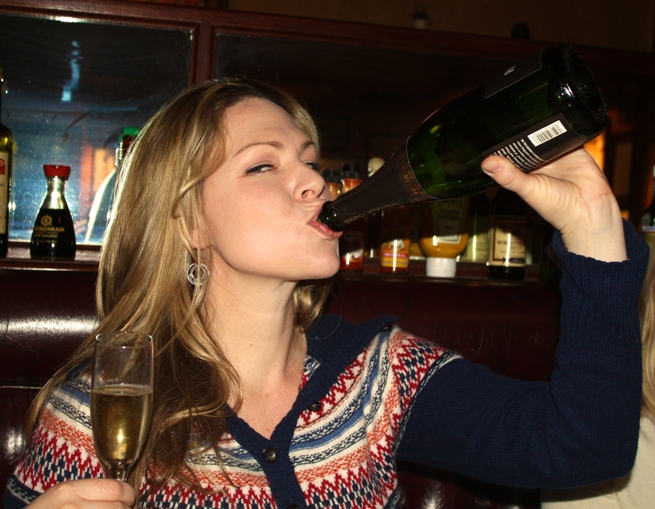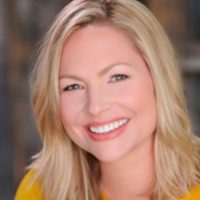
My very real struggle with alcohol, and how giving it up was the best thing I’ve ever done.
My number one lesson: you don’t have to be an alcoholic to realize booze is hurting your life.
Their wedding video popped up on Facebook like a hard punch to the gut.
Although the wedding had happened nine years prior, I wasn’t sure I wanted to see the remnants of their former wedding guest, Michelle, in color.
I know it sounds lovely: a beautiful ceremony at the same San Francisco church where Marilyn Monroe married Joe DiMaggio followed by a fancy reception nearby.
I remembered people celebrating, and of course, eating and drinking. I, however, had a tendency to drink anxiously. I’d plan the next drink during the first sips of the current drink. If the open bar was ending, I’d grab an extra drink to take to “my friend.” I always drank like the booze was about to run out, because the thought of being three drinks in with no drinks left felt a little like death.
Staring at the Facebook post, I finally pressed play to see if maybe, by the grace of God, I hadn’t made the final edit. I did.
After showing the gorgeous gown, the ring exchange, and the music-filled entrance into the reception, several guests expressed best wishes into the camera.
I finally popped on screen and as I watched, I assessed my drunk level at about a six. (I’d gotten to an eleven that night.) My cheeks shined red and my makeup looked sweaty. In mildly slurred speech, I wished the couple well and commented on the bride’s “spirit.” She has a positive and kind attitude all of the time, but I regret saying the spirit part because it could almost be construed as an insult. It’s a speech I would have done differently, had I been sober.
At 32, however, I had not been sober at any wedding in my adult life. In fact, I had not been sober at any major event, ever. I was simply too insecure in my skin to feel relaxed around a group of people without a drink in my hand. I also had no idea how to deal with pain, boredom, joy, or any emotion in between without something to numb me out. Feeling even the slightest bit of discomfort ignited a craving that warranted at least one to ten glasses of wine, or so I thought.
As you can imagine, this is where I’m about to make the hard segue into the part about me quitting the drink. I want you to know, though, that I’m not here to recruit anyone. I’m writing this to share how giving up booze taught me things I didn’t understand about myself and to try to take some of the stigma out of the “A” word.
Yes, I do consider myself an alcoholic, and I still feel uncomfortable writing that. In my experience, definitions vary depending on whom you talk to, and while most supported my decision to stop drinking, here are some of the other responses I got:
“No! You are not like one of ‘those’ people, Michelle.”
“Are you sure? Maybe you can just try to drink like an adult.”
“Maybe after a while, you can go back to having just one drink. You don’t drink every day, so you’re not an alcoholic.”
For me, alcoholism isn’t about quantity or frequency; it’s about obsession and where my brain goes when I drink. Upon the first sip, I am immediately wondering how much more I can get. I might also unblock and begin texting an ex-boyfriend. If I’m at a restaurant, I’m monitoring the server pouring the wine, and I’m pissed if the person next to me gets a milliliter more than I did. If it isn’t a school night, I’m plotting how long we can keep the party going and how long I can sleep off the hangover the next day.
I might even say some dumb sh*t to my boss at a work function, blackout, and wake up in a panic wondering if I got myself fired. But I never did get fired. I frequently humiliated myself, but I didn’t suffer any life-altering losses.
Since I didn’t need to drink every day, I rationalized my behavior and maintained that I definitely wasn’t an alcoholic. Deep down though, I always knew my relationship with pale ale wasn’t quite right. Because my favorite hobby was drinking with other people, I also believed I couldn’t function socially without it.
I will get feedback on this regarding moderation, and I will laugh. Michelle Kennedy has never been one to moderate anything. I want more clothes, more love, more episodes of “Game of Thrones,” and more chips and salsa. Moderation is about as elusive to me as the guy on a white horse carrying roses and a pepperoni pizza (with a side of ranch). Any time I did moderate my drinking and had just one glass, I’d inevitably go home wishing I could have one more.
At 35, during a career change and some major self-reflection, I decided to write down the most regretful moments of my life. From the time I kissed my friend’s crush in front of her, to a myriad of occasions where I got kicked out of bars due to loudness, I found that every single one of my worst Michelle moments involved booze.
When I decided to quit drinking at 36, I wasn’t convinced I was an alcoholic—I had just come to the firm conclusion that I sucked at drinking. Shame had repeatedly diminished my self-worth. I’d fallen on my face drunk, screamed at boyfriends for no reason, and lied and dramatized many situations. Any time I did something good (and there was a lot of good too), I would reflect on the degrading behavior and return to thinking I was terrible.
I spent my drinking years feeling inferior, not smart enough, not classy enough, and like a broken person.
Five years into sobriety, I don’t feel that way anymore.
Today, I have lost my obsession with booze, and I’ve learned to face emotion, even though it’s hard. I move through discomfort now so I don’t have to drink over it later. I’ve learned how to dance without elbowing people at the wedding, and I no longer yank the microphone away from the DJ to start my own karaoke show. I’m writing this on a beach in Nicaragua; a vacation former me would have spent—top to bottom—drunk. Enjoying life sober took a while, but it got easier over time, and I love the feeling of being present and remembering what I said and did the next day.
I won’t lie and say that giving up alcohol was easy.
In the beginning, I cried a lot and missed my life partner, Malbec. I felt like a bearded alien at social functions, realized I actually hate being the center of attention, and watched a few relationships fall away along with the booze. The process was painful and some people (including me at times) were incredibly uncomfortable with my decision. But, the rewards on the other side ended up outweighing the hard work it took to get here.
I’ve had many conversations over the years with others who also suck at drinking or flat-out call themselves alcoholics. The main reasons they keep drinking: it’s too embarrassing to stop and admit defeat and their entire social life is built around booze. The thing I ponder the most is the embarrassing part. While drunk, I did my best impressions (so I claim) and made some very boring situations really fun. I have more hilarious drinking stories than I can count.
It’s the nights when I flashed my boobs and boot scootin’ boogied into the mother of the bride so hard she spilled wine all over her dress that broke me down. It’s funny, but it’s not. I challenge anyone who is afraid of the embarrassment of quitting drinking to weigh that against his or her own drunken bull in a china shop moments. If alcohol is chipping away at self-worth or stunting a person’s progress in life, why must we match a perfect definition of “alcoholic” to quit?
Staying hung up on whether or not I was an alcoholic kept me drunk for far too long. Admitting that alcohol hurt my life was ultimately enough for me to put it down.
There are many ways to stop. There are also many ways to get medical and/or emotional support to learn how to do life stuff without alcohol. I got support around why I drank and the demoralizing things I did while drunk. The work transformed the way I relate to others and myself.
Am I ecstatic every day? No way. But, I’m content and I respect myself. I didn’t know this peace was attainable until I found the courage to let alcohol go.
~
Relephant:
7 Ways My Life Improved After I Quit Drinking.
The Price we Pay when Alcohol is our Soul Mate.
~
Author: Michelle Kennedy
Image: Author’s Own
Editor: Catherine Monkman
Copy & Social Editor: Nicole Cameron








Read 53 comments and reply